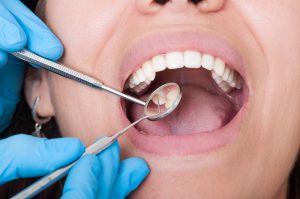Prevent Oral Infections, Prevent Sepsis: World Oral Health Day
March 15, 2019

The health of your mouth, which includes your gums, tongue, palate, and cheeks – anywhere inside your mouth – can have a significant impact on your overall health. Dentists can suspect illnesses, like diabetes or leukemia, by what they see during an oral examination. Also, an infection in your mouth can cause sepsis, which can lead to serious complications. On March 20th, professionals who work in oral health, from dental assistants and hygienists to dentists and dental specialists, mark World Oral Health Day, a time when they want you to pay special attention to the importance of good oral care.
According to the American Dental Association, about 100 million people in the United States don’t see a dentist every year. Yet, the World Health Organization (WHO) states that “oral diseases are the most noncommunicable diseases (NCDs) and affect people throughout their lifetime, causing pain, discomfort, disfigurement, an even death.” The organization goes on to say that of the seven oral diseases and conditions that cause most of the problems associated with oral disease, almost all are preventable or treatable in its early stages. In the U.S., the most common conditions are cavities (tooth decay), gum disease (periodontal disease), oral cancer, and trauma to the mouth, as from being hit in the face.
The sepsis connection
If we look at just those four conditions, we can see the connection they may have with sepsis. Cavities are an opening to the body, which can harbor bacteria and lead to an infection. The Centers for Disease Control (CDC) states, “Although tooth decay is largely preventable, it remains one of the most common chronic disease of childhood, affecting up to two-thirds of adolescents. Cavities also affect adults; among those aged 20-64 years, more than 90% had at least one cavity, and 27% had untreated decay. Untreated tooth decay can lead to abscess (a severe infection) under the gums which can spread to other parts of the body and have serious, and in rare cases fatal, results.”
Broken teeth from trauma also allow for bacteria to enter the body. Gum disease is itself often the result of frequent infection or inflammation in the mouth, and can provide an open pathway for infection. Oral cancer, whether of the tongue, palate, or elsewhere, requires treatment that can weaken your immune system and make infections harder to fight.
Taking care of your mouth
The easiest way to decrease your risk of diseases or problems with your mouth is with good oral hygiene. The American Dental Association acknowledges that everyone has different needs and abilities, but the recommend the following for optimal mouth care:
- Brush teeth at least twice a day with a fluoride toothpaste
- Consider using an electric toothbrush if you have trouble cleaning your teeth with a manual one
- Consider using a fluoridated mouthwash at least once a day, particularly if you have a higher risk of developing cavities
- Clean between your teeth daily by flossing or using a cleaning device
- Limit sweet and sugar intake
- Stop smoking if you smoke
- See your dentist regularly, according to your dentist’s recommendations
When to see a dentist between check-ups
Because problems in your mouth can affect the rest of your body, it’s essential that you see your dentist if you develop:
- A toothache, even if it goes away
- Sensitivity in a tooth to hot or cold
- Bad breath (could be a sign of infection)
- Inflamed and/or bleeding gums
- Any changes in color or appearance of lumps on your tongue, cheeks, gums, or palate
- Extraordinarily dry mouth
If you’ve been delaying your next dental appointment, use this opportunity as a reminder to make that call. Many people don’t want to see a dentist after a long time away from the office because they’re embarrassed over the condition of their teeth. They fear being judged. Dentists and everyone who works in oral health knows how fearful some people are when it comes to going to the dentist. They also know that often, oral health is a low priority when there is so much else in daily life demanding attention. Don’t allow embarrassment to stop you. Your health is more important.
To learn more about oral health and sepsis, visit Sepsis and Dental Health, part of the Sepsis and… library.





























